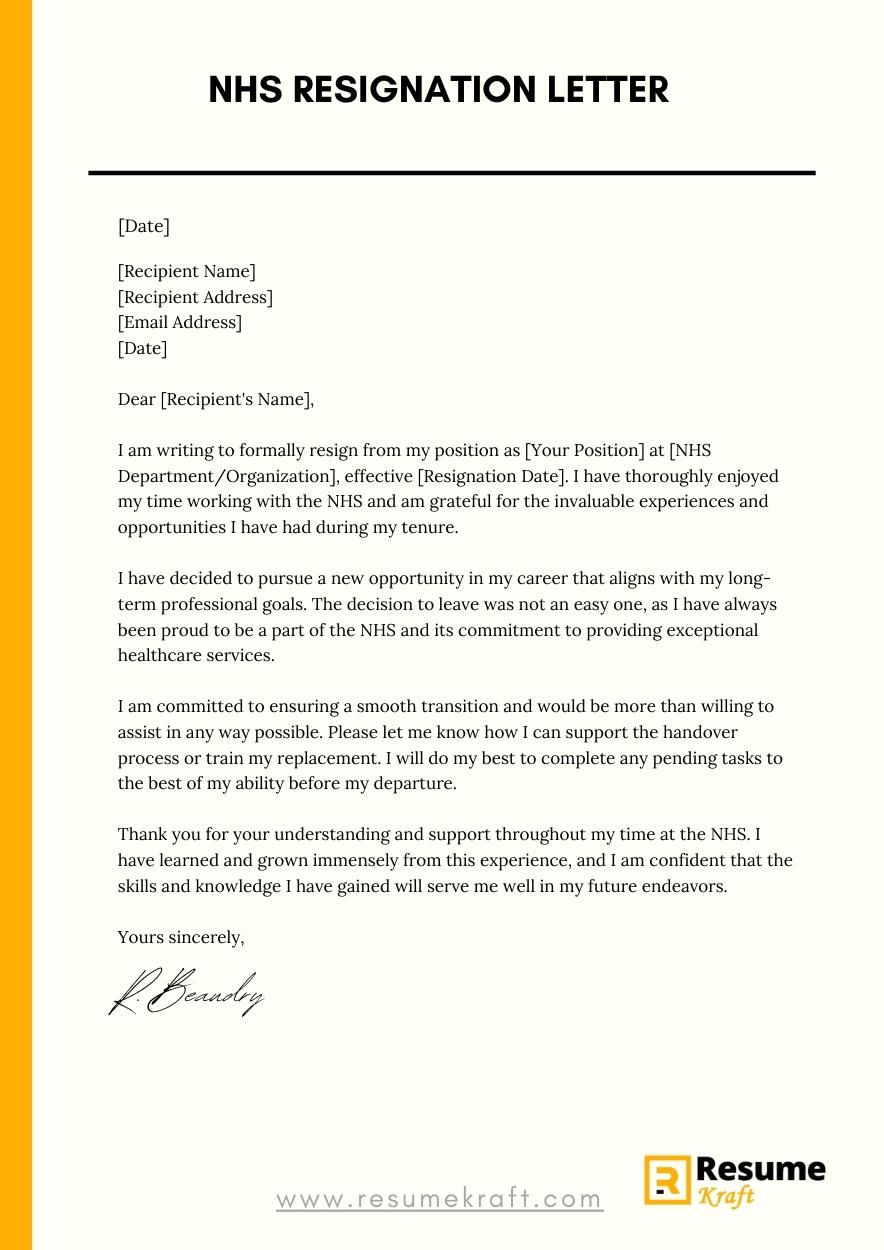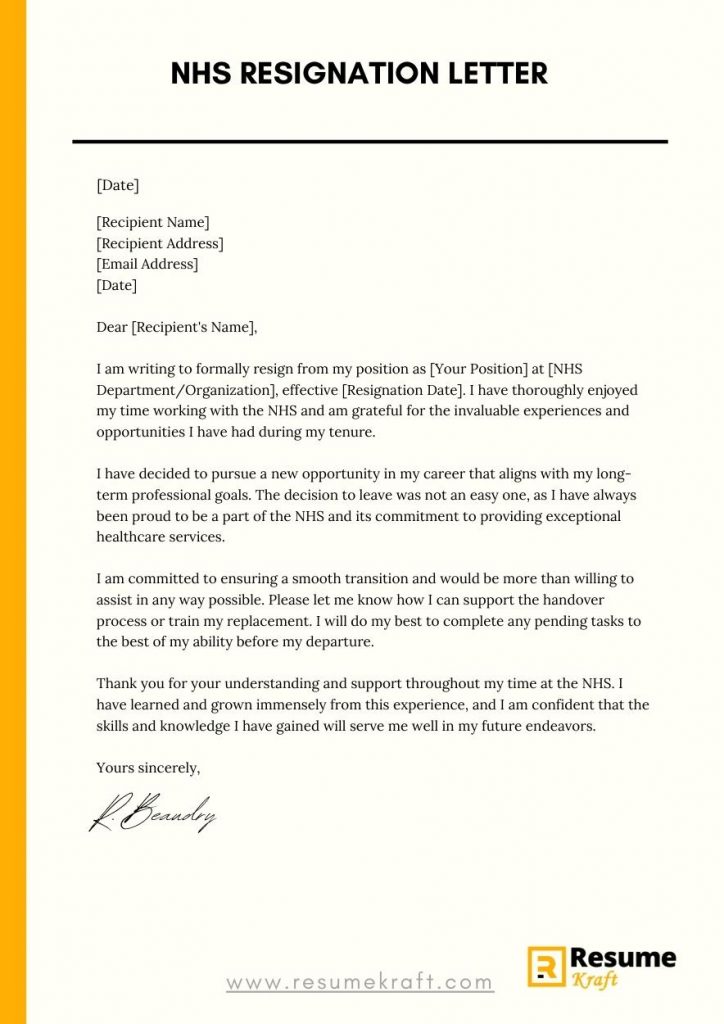
In this article, we will provide you with a step-by-step guide on how to write a resignation letter specifically for the NHS (National Health Service). Whether you are a doctor, nurse, or any other healthcare professional, resigning from your position in a professional and respectful manner is crucial. We will also include real-life resignation letter samples to help you draft your own letter effectively.
What To Include in an NHS Resignation Letter
When writing an NHS resignation letter, it is important to include the following key components:
- Date: Begin the letter with the current date, followed by your contact information and the contact details of the person to whom the resignation letter is addressed.
- Salutation: Address the recipient of the letter with a professional greeting, such as “Dear [Supervisor’s Name].”
- Statement of Resignation: Clearly state your intention to resign from your position in a concise and unambiguous manner. Mention the effective date of your resignation, providing adequate notice according to your employment contract or policies.
- Reason (Optional): While it is not mandatory to include a reason for your resignation, you may choose to briefly explain your decision in a professional and positive manner. However, if you have any concerns or issues that need to be addressed, it is advisable to discuss them with your supervisor in person.
- Gratitude: Express your appreciation for the opportunities and experiences you have had while working in the NHS. Highlight any personal or professional growth you have achieved during your tenure.
- Transition Support: Offer your assistance in ensuring a smooth transition, such as training your replacement or providing any necessary handover documentation.
- Closing: Conclude the letter with a professional closing, such as “Yours sincerely,” followed by your full name and signature.
What Not to Include in Your NHS Resignation Letter
When writing an NHS resignation letter, it is important to avoid the following:
- Negative Remarks: Avoid expressing any negative feelings or criticisms about your colleagues, supervisors, or the organization itself. Keep the tone of your letter positive and professional.
- Personal Gripes: Do not use the resignation letter as an opportunity to vent personal frustrations or grievances. It is best to address such issues in a separate, constructive conversation with your supervisor or HR department.
- Excessive Detail: While it is important to provide sufficient information, avoid including unnecessary details that may complicate the letter or make it overly lengthy.
How To Format an NHS Resignation Letter
In terms of formatting, an NHS resignation letter should adhere to the following guidelines:
- Professional Tone: Maintain a professional and respectful tone throughout the letter. Avoid using informal language or slang.
- Conciseness: Keep the letter concise and to the point, focusing on the essential information and avoiding unnecessary repetition.
- Font and Style: Use a professional font (e.g., Arial, Times New Roman) and keep the font size between 10 and 12 points. Use a formal business letter format, aligning the text to the left.
- Proofreading: Before finalizing your letter, proofread it carefully to ensure there are no grammatical or spelling errors. A well-written and error-free letter reflects professionalism.
NHS Resignation Letter Samples
Below, you will find two examples of resignation letters for the NHS:

Printed Resignation Letter Sample:
[Your Name]
[Your Address]
[City, State, ZIP]
[Email Address]
[Phone Number]
[Date]
[Supervisor’s Name]
[Supervisor’s Position]
[NHS Department/Organization]
[Address]
[City, State, ZIP]
Dear [Supervisor’s Name],
I am writing to formally resign from my position as [Your Position] at [NHS Department/Organization], effective [Resignation Date]. I have thoroughly enjoyed my time working with the NHS and am grateful for the invaluable experiences and opportunities I have had during my tenure.
I have decided to pursue a new opportunity in my career that aligns with my long-term professional goals. The decision to leave was not an easy one, as I have always been proud to be a part of the NHS and its commitment to providing exceptional healthcare services.
I am committed to ensuring a smooth transition and would be more than willing to assist in any way possible. Please let me know how I can support the handover process or train my replacement. I will do my best to complete any pending tasks to the best of my ability before my departure.
Thank you for your understanding and support throughout my time at the NHS. I have learned and grown immensely from this experience, and I am confident that the skills and knowledge I have gained will serve me well in my future endeavors.
Yours sincerely,
[Your Full Name]
[Your Signature]
Email Resignation Letter Example:
Subject: Resignation – [Your Name]
Dear [Supervisor’s Name],
I hope this email finds you well. I am writing to formally submit my resignation from my position as [Your Position] at [NHS Department/Organization], effective [Resignation Date].
I am immensely grateful for the opportunities and experiences I have had while working with the NHS. It has been a privilege to contribute to the organization’s mission of providing high-quality healthcare to those in need. However, after careful consideration, I have decided to pursue a new professional opportunity that aligns with my long-term goals.
I am committed to ensuring a seamless transition and would be more than happy to provide any necessary assistance during the handover process. Please let me know how I can best support the team in my remaining time, whether it is training my replacement or completing any pending tasks.
I want to express my sincere gratitude for your guidance and support throughout my tenure at the NHS. I have grown both professionally and personally during my time here, and I will always cherish the relationships and memories I have made.
Thank you for your understanding, and please do not hesitate to reach out if you need any further information.
Yours sincerely,
[Your Full Name]
[Your Contact Number]
[Your Email Address]
Key Takeaways
Writing an NHS resignation letter requires a professional and respectful approach. Remember these key points:
- Include the essential components: date, salutation, statement of resignation, reason (optional), gratitude, and closing.
- Avoid negative remarks or excessive detail in your letter.
- Maintain a professional tone and format the letter correctly.
- Proofread your letter for errors before finalizing it.
- Offer your assistance for a smooth transition.
Frequently Asked Questions
1. How much notice should I give in my NHS resignation letter?
It is advisable to give at least four weeks’ notice in your NHS resignation letter, as it allows sufficient time for your employer to find a suitable replacement and arrange for a smooth handover.
2. Should I include the reason for my resignation in my NHS resignation letter?
Including the reason for your resignation is optional. If you choose to mention it, it is important to do so in a positive and professional manner. However, if you have any concerns or issues, it is best to discuss them with your supervisor or HR separately.
3. Can I resign from the NHS via email?
Yes, you can resign from the NHS via email. However, it is recommended to follow up with a printed copy of the resignation letter for record-keeping purposes.
4. Can I use a resignation template for my NHS resignation letter?
While using a resignation template can be helpful for structure, it is important to personalize the letter and include specific details relevant to your position and experience with the NHS.
5. Should I provide assistance during the transition period in my NHS resignation letter?
Offering your assistance during the transition period is highly regarded. It demonstrates your professionalism and dedication to ensuring a smooth handover process. Be specific about the type of support you can provide in your resignation letter.
Conclusion
Writing an NHS resignation letter requires thoughtfulness and professionalism. By following the guidelines and examples provided in this article, you can effectively communicate your decision to resign while maintaining a positive and respectful tone. Remember to personalize your letter and express gratitude for your experiences in the NHS.

